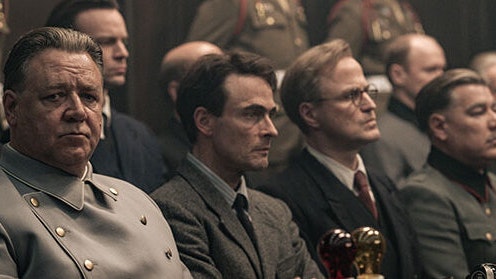At the end of World War II, US Army psychiatrist Douglas Kelley (Rami Malek) is tasked with evaluating the mental health of Nazi commanders, including second-in-command Hermann Göring (Russell Crowe), ahead of the Nuremberg Trials — the first time that individuals could be held accountable for war crimes.
At just under 150 minutes, James Vanderbilt’s Nuremberg — detailing the historic war trials for the surviving Nazis of World War II — moves along at an impressive clip. The meat of the film, the psychological face-offs between US military psychiatrist Douglas Kelley (Rami Malek) and unrepentant Nazi second-in-command Hermann Göring (Russell Crowe), is deeply compelling. Göring is intimidating both physically (particularly in the way he fills the frame) and mentally; Crowe’s carefully calculated combination of righteousness, fury and narcissism makes for an especially complex and frightening performance. He presents a fascinating ethical quandary for Kelley, who seems to get worryingly close to Göring after hundreds of hours together. The tête-a-tête between Göring and Kelley delivers an enthralling moral dilemma in its reminder that the people who committed these atrocities were human beings.

Though Nuremberg has a surprising sense of humour, including several amusing smash-cuts, Vanderbilt is careful to give the weighty material the respect and space it deserves. That’sparticularly evident in the film’s most harrowing scene: when the horrifying footage of the Holocaust is shown in the trial for the first time, Vanderbilt approaches the moment with utmost seriousness, cutting between the newsreel and people’s devastated reactions to it. It’s a crucial scene and the linchpin of Nuremberg, and Vanderbilt’s careful, considerate direction makes it deeply moving.
Occasionally, that balance between creating entertainment and delivering its message are at odds, as when a crucial showdown between prosecutor Robert Jackson (Michael Shannon) and Göring is deflated by one too many glib asides. It’s a frustrating niggle — it’s already a powerful moment without other characters reminding us how important it is — but mostly, Nuremberg delivers its message to great effect. The cast is uniformly impressive. It’s Leo Woodall, as translator Howie Triest, who walks away with the film, delivering a shattering monologue that won’t leave a dry eye in the house.
Nuremberg isn’t the first, nor the best film about the Nuremberg Trials (that’d be Stanley Kramer’s tremendous Judgment At Nuremberg, from 1961). But it tackles familiar material with an intriguing new angle as it investigates the psychological elements of this moment in history, and is a worthy addition to the canon of films about one of the world’s greatest tragedies.
Well-paced, expertly performed, and an urgent call to stand up to fascism, Nuremberg is a powerful, sweeping story of the attempt to bring an unthinkable evil to justice.

